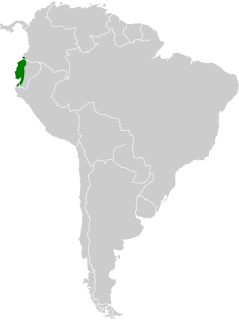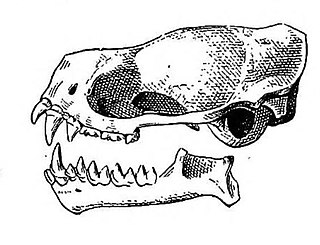
The big red bat is a species of vesper bat from South and Central America.

The pygmy round-eared bat is a bat species from South and Central America.

The white-throated round-eared bat is a South and Central American bat species found from Honduras to Bolivia, Paraguay and Brazil. It creates roosts inside the nests of the termite, Nasutitermes corniger. It thrives on a mainly insect-based diet, focusing on the surfaces of foliage to hunt, and also eats fruit and pollen. It has a very wide range and is a common species over much of that range, so the International Union for Conservation of Nature has assessed its conservation status as being of "least concern".

The Incan little mastiff bat is a species of bat in the family Molossidae, the free-tailed bats. It belongs to the subgenus Micronomus.

The lesser yellow-shouldered bat is a species of bat in the family Phyllostomidae. It is native to Peru and Ecuador. It is threatened by habitat loss.

The Borneo fruit bat is a species of megabat found in the mountains of Borneo, specifically East Malaysia and Brunei. It is considered a subspecies of Aethalops alecto by some authors.

Benkeith's short-tailed bat is a leaf-nosed bat species found in Peru, Bolivia, and Brazil. It very closely resembles the chestnut short-tailed bat, and the two species are likely often confused.

Gallagher's free-tailed bat is a free-tailed bat endemic to the Democratic Republic of the Congo. Only one individual has ever been documented.

The western round-eared bat is a bat species found only on the Pacific coast of northwestern Ecuador.

The Matapalo broad-nosed bat, Platyrrhinus matapalensis, is a species of leaf-nosed bat described in 2005. It is found in South America.

Eumops nanus is a species of bat found in Central and South America.

Platyrrhinus ismaeli is a species of bat found in South America.
Patricia's disk-winged bat is a species of disk-winged bat found in South America.

Orcés’s long-tongued bat is a species of leaf-nosed bat found in Ecuador.
Boeadi’s roundleaf bat is a species of roundleaf bat found in Indonesia.
Burton's yellow-shouldered bat is a species of leaf-nosed bat found in Panama and Costa Rica.

The western yellow bat is a species of vesper bat endemic to Madagascar.

Platyrrhinus albericoi is a species of leaf-nosed bat found in South America.
Sturnira bakeri is a species of bat found in South-America.

Sturnira parvidens is a species of leaf-nosed bat found in Central America.

















